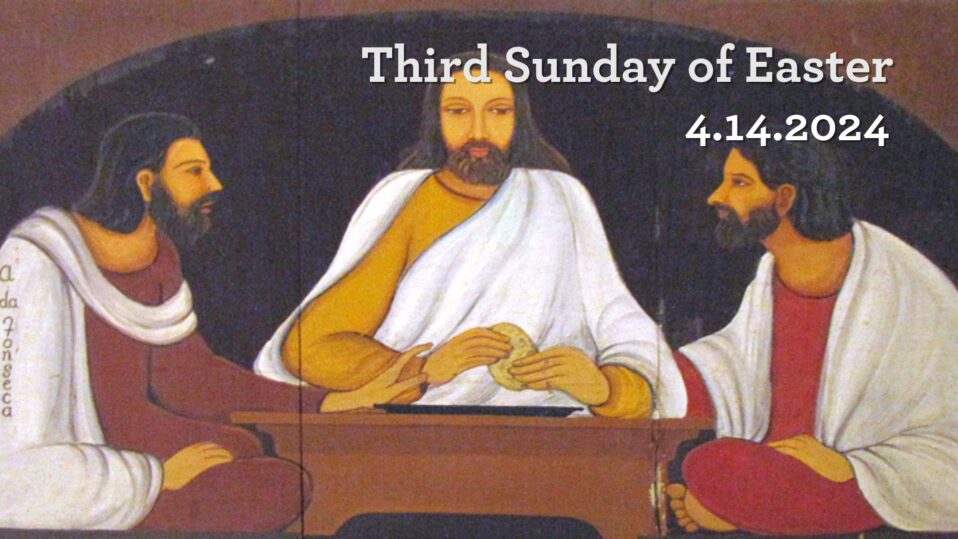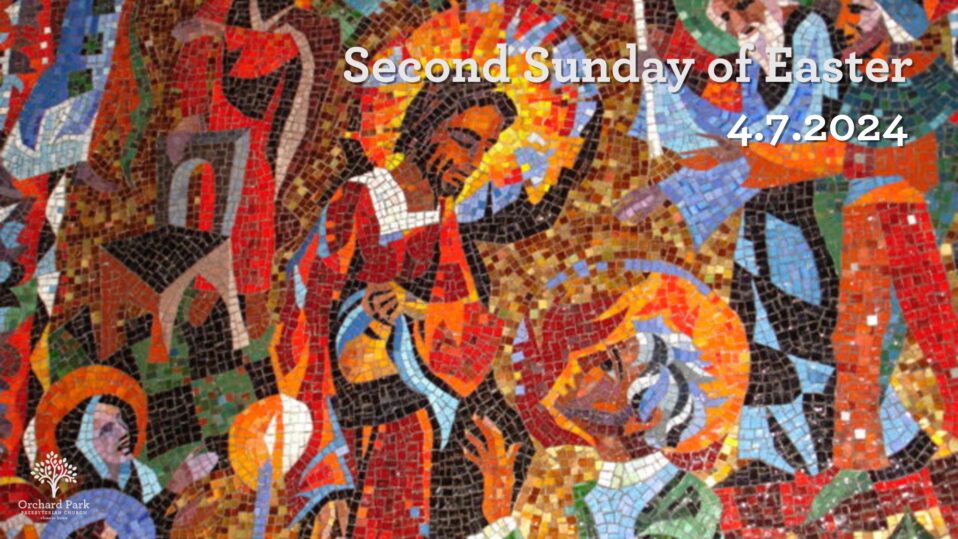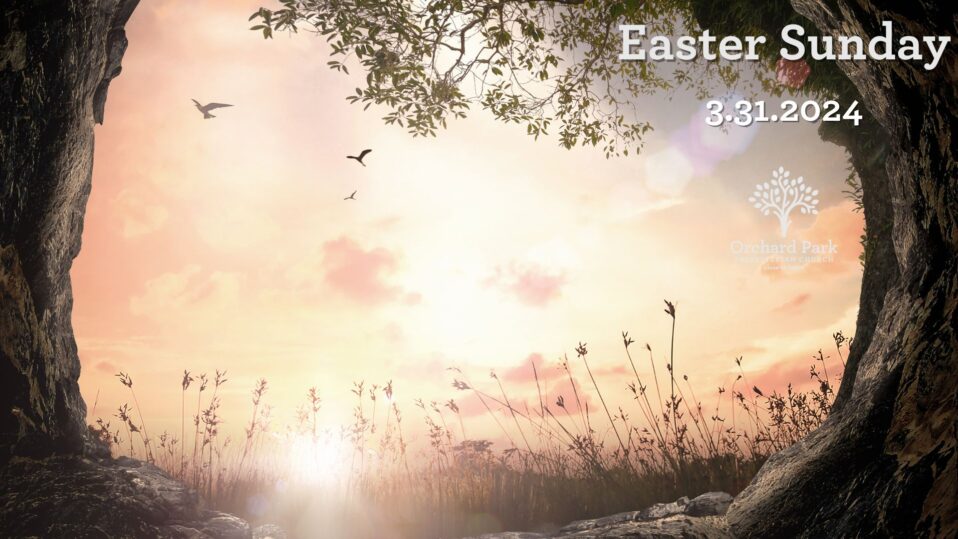As stories about Jesus and his ministry go, this one is probably one of the most well-known. You can find the feeding of the 5000 in all four of the Gospels. It’s a story about a miracle that people have tried to explain away. Maybe it was a stone soup scenario, and everyone shared what they had. Or maybe people packed their own lunches and didn’t need to share. The idea of 5000 people coming to a mountain ahead of Jesus to see him sounds like a miracle in and of itself. This story is both about humanity and divinity. It starts with very human needs. The disciples have been working hard, doing ministry, casting out demons, curing the sick, teaching the Gospel, and they come back and share all of this with Jesus and Jesus says, let’s get away and rest. Jesus says follow me to a restful place and so they go out where there are more plants than people, more sky than buildings, more space than traffic. The very human need of rest is how the story begins.
No sooner do they roll out their sleeping bags than they see that there will be no time for camp a relaxing campfire tonight. No. There are people. Lots and lots of people. This part of the story is where anyone who in ministry smiles and acknowledges a universal truth. Ministry is all about interruption.
Henri Nouwen wrote of a now-famous conversation which helped him think about interruptions as something other than a bother. He writes, “While visiting the University of Notre Dame, where I had been a teacher for a few years, I met an older experienced professor who had spent most of his life there. And while we strolled over the beautiful campus, he said with a certain melancholy in his voice, “You know . . . my whole life I have been complaining that my work was constantly interrupted, until I discovered that my interruptions were my work.”
Nouwen later reflected “It has been the interruptions to my everyday life that have most revealed to me the divine mystery of which I am a part . . . All of these interruptions presented themselves as opportunities . . . invited me to look in a new way at my identity before God. Each interruption took something away from me; each interruption offered something new.”
Jesus responds to all of the people not with frustration, but with compassion and the disciples don’t seem perturbed either. Jesus looks out and has compassion over all of the people and has compassion over them saying, they are like a sheep without a shepherd. Interesting metaphor that even those of us not the shepherding business seem to understand. The word compassion comes from a Latin word, compassion, which means, to feel with. But the Greek word is splanchna, which refers to the intestines or the bowels. To have compassion on someone is to be moved in your bowels for them. Doesn’t sound too nice, does it – when I saw you, I had a movement.
The hours go by, and the afternoon Sun turns to late in the day and the disciples look at all of these people and realizes they need to head home, because in this remote area there is no access to food. Jesus says to the disciples, that’s us, you give them something to eat, the disciples/we reply saying “but we only have limited resources.” Jesus asks, “what have you got,” and the disciples/we reply, this much and miraculously Jesus makes the little amount grow to the point that the people are full.
There are times when I get a notification on my phone and read about one more tragedy after another and I feel compassion, my heart does feel pulled, but I feel limited in my resources and weary in how to help. The number of deaths and destructions due in Puerto Rico, Cuba and Florida are startling. The images of people riding on the water on air mattresses and moving boats out of their front porches is beyond belief. The numbers of homes and businesses lost, the amount of life lost is sobering.
What’s even more horrendous, if horror can measure, are the millions of people impacted by flooding in Pakistan. UNICEF reports that: Torrential monsoon rains triggered the most severe flooding in Pakistan’s recent history, washing away villages and leaving around 3.4 million children in need of assistance and at increased risk of waterborne diseases, drowning and malnutrition.
As floodwaters slowly recede, the sheer scale of damage is being revealed. Hundreds of thousands of homes have been damaged or destroyed, while many public health facilities, water systems and schools have been destroyed or damaged. Young children are living out in the open with their families, with no drinking water, no food, and no livelihood, exposed to a wide range of new flood-related risks and hazards, including from damaged buildings and drowning in floodwaters.
Let us not forget that earlier this summer Kentucky was hit with epic flooding, only after surviving epic tornadoes the year before. The flooding in July killed 26 people.
Thousands of people have been impacted by climate catastrophes this year and they are left with loss of the basic needs of shelter and rest.
What do we do? It will take a miracle to take care of all these people. It will take an even bigger miracle to stop further disasters at this magnitude. This mess is huge, we can’t take care of all of these hungry people.
Jesus is clear, he says, give them something to eat. You see the problem, do something about it. Ministry is not meant to be passive. If everyone one of us did a small thing with a small thing that we had, we could a very big thing. Some of us can give financially, others of us can do things to protect the planet. We can reduce our CO2 footprint, we can recycle, we can reuse resources, we can conserve water. It seems so little, as little as five loaves and two fish.
Renowned preacher Fred Craddock wrote,
Two things are absolutely essential to the church: Jesus Christ and human need. In that place where the church dwells are the rich and the poor, the haves and the have nots, the powerful and the powerless. There are those who are educated and those who are ignorant. There are those who believe and those who don’t believe. There are the high and the mighty and the lowly who nobody knows. In between is the Church of Jesus Christ. The church is called to help both the haves and the have nots, the powerful and the powerless. The church is to be the gospel for all these people. As long as you have Christ and as long as you have needs, you have the church.” [p 87/88, Cherry Log Sermons]
That’s why there is a church—to meet human need: needs like food and shelter and clothing, also needs of the human spirit, like encouragement and hope and love. And there is a whole other set of needs, for those of us who are not physically hungry, or cold or naked or alone: needs for authenticity and meaning and purpose. The need to live and act and have been in a way that honestly reflects the best of who we are and what we believe. The church is here for us to put our faith into practice; to do what we believe: to become what we hope for.
Sometimes unforgettable things happen. – We call them miracles.
Craddock concluded his sermon on the church with a story I haven’t been able to forget. He was the keynote speaker at a conference at Clemson University. Before his lecture a young woman was going to begin the program with a devotional. She was a plain, earnest young woman and as she approached the microphone, he could see that she had a yellow legal pad that had a lot of writing on it. “Uh oh,” Craddock thought, “we’re here for the night.”
She spoke softly and in what he thought was a foreign language, and then another language, and then another one, and on and on it went. One sentence in sixty or seventy languages of the world . . . the one sentence said more perhaps than any other sentence in the world. When she got to German and Spanish and French, he began to recognize it. The last time she spoke it, she spoke it in English. She said, “Mommy, I’m hungry,” and then she sat down.
Jesus Christ and human need. When you have them, you have the church, or the opportunity, the God-given responsibility to be a church.
“Faith without works is dead,” James said. And in God’s unique economy—our need to give, and love and help and heal, to practice our faith, is every bit as great as the needs of the hungry, the poor, the elderly, and the infirm.
The good news is that there will always be human need and there will always be Jesus Christ, the miracle will happen every time the church shows up and we give them something to eat.
Amen.
Rev. Dr. Shelly Wood



